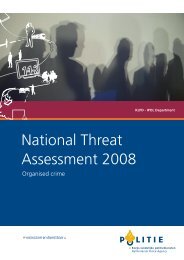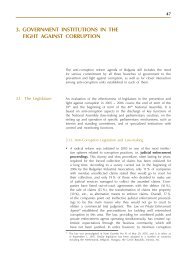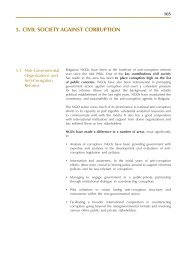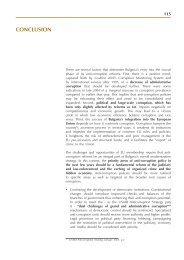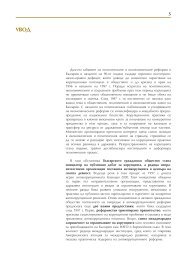Assessing the Effectiveness of Organized Crime Control Strategies ...
Assessing the Effectiveness of Organized Crime Control Strategies ...
Assessing the Effectiveness of Organized Crime Control Strategies ...
You also want an ePaper? Increase the reach of your titles
YUMPU automatically turns print PDFs into web optimized ePapers that Google loves.
<strong>Assessing</strong> <strong>the</strong> <strong>Effectiveness</strong> <strong>of</strong> <strong>Organized</strong> <strong>Crime</strong> <strong>Control</strong> <strong>Strategies</strong>:<br />
A Review <strong>of</strong> <strong>the</strong> Literature<br />
revealed systematic and organized corruption, particularly in <strong>the</strong> department’s vice divisions,<br />
where bribes were an accepted part <strong>of</strong> police life (Senna and Siegel, 1996: 338).<br />
The Pennsylvania <strong>Crime</strong> Commission’s 1980 Report details a substantial number <strong>of</strong> indictments<br />
and convictions that were based on information supplied by <strong>the</strong> Commission. The report notes,<br />
however, that despite <strong>the</strong> successes achieved by law enforcement agencies during <strong>the</strong> 1970s, OC<br />
flourished during that period (Pennsylvania <strong>Crime</strong> Commission, 1980:259).<br />
The Chicago <strong>Crime</strong> Commission is <strong>the</strong> oldest, most active, and is considered <strong>the</strong> most respected<br />
citizens’ crime commission in <strong>the</strong> US (H<strong>of</strong>fman, 1987:83). It is privately-funded and its roll <strong>of</strong><br />
donors includes some <strong>of</strong> America’s most prominent businesses—Sears and Roebuck, Kraft,<br />
Amoco. The membership comprises nearly four hundred business leaders, many <strong>of</strong> whom<br />
donate <strong>the</strong>ir own expertise to <strong>the</strong> Commission’s work. The Commission performs a “watchdog”<br />
role, monitoring <strong>the</strong> behaviour <strong>of</strong> public <strong>of</strong>ficials responsible for law enforcement.<br />
The Chicago Commission has engaged in awareness-raising activities in relation to OC on an<br />
ongoing basis. Public enemies lists, biographical sketches <strong>of</strong> OC figures, and related information<br />
are continually released to <strong>the</strong> media and, hence, to <strong>the</strong> public. The Commission has also<br />
lobbied in favour <strong>of</strong> various bills designed to combat OC (H<strong>of</strong>fman, 1987:90).<br />
One <strong>of</strong> <strong>the</strong> Chicago Commission’s most innovative programs is <strong>the</strong> “Business Advisory Name<br />
Check Service.” This service is designed to provide information to legitimate businesses<br />
concerning any criminal connections <strong>of</strong> a loan applicant, potential employee, client, vendor, or<br />
business. Each year, <strong>the</strong> Commission receives between 3,000 to 5,000 requests for information;<br />
however, <strong>the</strong> majority <strong>of</strong> <strong>the</strong>se requests come from law enforcement and investigative agencies.<br />
Many <strong>of</strong> <strong>the</strong> requests also originate from out <strong>of</strong> state. In 1985, <strong>the</strong> Commission began to cut<br />
back this service due to a lack <strong>of</strong> resources necessary to comply with federal rules regarding<br />
reference checks (H<strong>of</strong>fman, 1987:94). For example, <strong>the</strong> Commission faced a $3 million libel<br />
suit initiated by a Chicago man for alleged defamatory statements contained in literature it<br />
published. While <strong>the</strong> name check service may reduce <strong>the</strong> infiltration <strong>of</strong> OC in legitimate<br />
business, H<strong>of</strong>fman (1987) notes that such infiltration is a relatively minor and declining problem.<br />
The Quebec Police Commission (1976), in its inquiry into OC, also seemed to make a positive<br />
contribution, although much <strong>of</strong> <strong>the</strong> evidence <strong>of</strong> its impact is anecdotal and advanced by <strong>the</strong><br />
Commission itself. Charges were brought against a number <strong>of</strong> OC figures following <strong>the</strong> public<br />
hearings. The Commission claimed that citizens became better informed about OC; in fact, a<br />
public survey undertaken on its behalf suggested that <strong>the</strong> population had learned from <strong>the</strong><br />
hearings (Quebec Police Commission, 1976:315). The Commission claimed that informing<br />
citizens was empowering, leading <strong>the</strong>m to resist submitting to fear and intimidation. There was<br />
more evidence, according to <strong>the</strong> police, <strong>of</strong> cooperation with <strong>the</strong> authorities, an indication <strong>of</strong><br />
greater confidence in <strong>the</strong> justice system. The Commission also claimed that many gangsters kept<br />
a lower pr<strong>of</strong>ile and even left <strong>the</strong> province or country to avoid testifying before it. Such inactivity<br />
or exile was said to disrupt activities associated with OC.<br />
A downside <strong>of</strong> government-sponsored commissions is that <strong>the</strong>y can be dissolved by <strong>the</strong><br />
government. Political interference seemed to be at <strong>the</strong> root <strong>of</strong> <strong>the</strong> dissolution <strong>of</strong> <strong>the</strong> Pennsylvania<br />
40 | Research and Statistics Division / Department <strong>of</strong> Justice Canada



